| Srl | Item |
| 1 |
ID:
128225
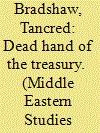

|
|
|
|
|
| Publication |
2014.
|
| Summary/Abstract |
This paper addresses an aspect of British policy in the Trucial States that has received scant scholarly attention. It examines British attempts to promote economic and social development in the Trucial States, and places this policy within the context of British attitudes towards the economic development of the colonial empire. During the 1950s Britain's interest in the Arabian Peninsula expanded, in notable contrast with the rest of the Middle East. One aspect of this expanded role was British efforts to improve the economic and social conditions prior to the discovery of oil in Abu Dhabi in 1958. British officials on the ground were concerned to improve the lot of the population of these impoverished shaikhdoms for a combination of political and strategic and ethical reasons. This article shows that attempts to introduce a modicum of economic and social development in the Trucial States were hindered by the Treasury's refusal to provide adequate funds, and because of inherent problems in finding suitable development projects. Nonetheless, the plans put in place during the 1950s did provide the foundations for subsequent development programmes, which, in turn, drastically expanded as a result of oil wealth.
|
|
|
|
|
|
|
|
|
|
|
|
|
|
|
|
| 2 |
ID:
152611
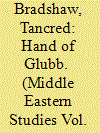

|
|
|
|
|
| Summary/Abstract |
This article discusses the origins and formative years of the Trucial Oman Levies (renamed Trucial Oman Scouts in March 1956), a small force that was established by the British in Trucial States in 1951. The establishment of the Levies highlights a myriad of issues including who was going to command the force, how and where to recruit soldiers, the financial cost of the levies, and the diplomatic and strategic implications of raising a small force in a region whose strategic value grew immensely due to the exploitation of oil. Recent operations in Afghanistan and Iraq highlight the contemporary importance of understanding the historical experience of trying to raise indigenous armed forces.
|
|
|
|
|
|
|
|
|
|
|
|
|
|
|
|
| 3 |
ID:
077010
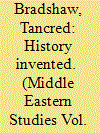

|
|
|
| 4 |
ID:
177687
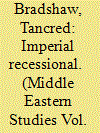

|
|
|
|
|
| Summary/Abstract |
The British imperial project in the Bahrain, Qatar and the Trucial States originated in the early nineteenth century when the Government of India signed treaties with the rulers of the sheikhdoms. It was a model of low-cost imperialism in which the British secured their economic and strategic interests. Whitehall rarely intervened until the Labour Party came to power in 1964. Domestic economic and political considerations led Harold Wilson to announce in January 1968 that the British would withdraw from the Gulf by the end of 1971. This decision was devoid of any strategic rationale, and was regarded with dismay by the rulers of the sheikhdoms. The rulers were responsible for establishing a political structure, and until the summer of 1970 the Foreign Office left them to their own devices. The election of the Conservative government in June 1970 led to a fundamental re-evaluation of the Foreign Office’s policy and Sir William Luce was appointed to establish a viable political structure for the sheikhdoms. Against the odds, Luce and the Foreign Office played a key role in creating the United Arab Emirates. Bahrain and Qatar became independent states.
|
|
|
|
|
|
|
|
|
|
|
|
|
|
|
|
| 5 |
ID:
093976
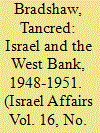

|
|
|
|
|
| Publication |
2010.
|
| Summary/Abstract |
This article accounts for Israel's failure to take the historical opportunity to invade the West Bank during the 1948 war. It also considers the nature of British support for Jordan between 1948 until the death of King Abdullah in 1951. British interests in Transjordan were determined by strategic factors that were outlined in the 1948 Anglo-Transjordan Treaty. Although the British were bound by the treaty to come to Jordan's assistance in the case of an invasion, in practice this would have been very difficult to achieve short of invading Israel from Egypt. This paper argues that the Israelis failed to invade the West Bank in 1948 because they were deterred by the possibility of British intervention and because of divisions within the Israeli political establishment.
|
|
|
|
|
|
|
|
|
|
|
|
|
|
|
|
| 6 |
ID:
177280
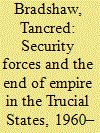

|
|
|
|
|
| Summary/Abstract |
One of the notable characteristics of Britain’s imperial role in the Trucial States (United Arab Emirates from 1971) was the establishment of armed forces and security services. The Trucial Oman Scouts (TOS) were the most important proto army in the sheikhdoms. During the last decade of the pax Britannica in the Trucial States competing units were also established in the region. The Foreign Office also sought to counter the potential threat of opposition groups inspired by several models of Arab nationalism by developing the internal security forces of the sheikhdoms. The establishment of these military organisations was attractive because they were much cheaper than deploying British forces. In January 1968 the Labour government decided to withdraw from East of Suez. The armies of the Trucial States formed the basis of the UAE armed forces, and British played a central role in creating the security state in the Emirates.
|
|
|
|
|
|
|
|
|
|
|
|
|
|
|
|
| 7 |
ID:
180303
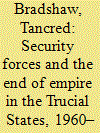

|
|
|
|
|
| Summary/Abstract |
One of the notable characteristics of Britain’s imperial role in the Trucial States (United Arab Emirates from 1971) was the establishment of armed forces and security services. The Trucial Oman Scouts (TOS) were the most important proto army in the sheikhdoms. During the last decade of the pax Britannica in the Trucial States competing units were also established in the region. The Foreign Office also sought to counter the potential threat of opposition groups inspired by several models of Arab nationalism by developing the internal security forces of the sheikhdoms. The establishment of these military organisations was attractive because they were much cheaper than deploying British forces. In January 1968 the Labour government decided to withdraw from East of Suez. The armies of the Trucial States formed the basis of the UAE armed forces, and British played a central role in creating the security state in the Emirates.
|
|
|
|
|
|
|
|
|
|
|
|
|
|
|
|